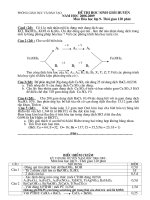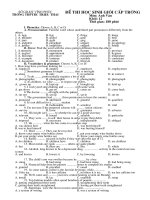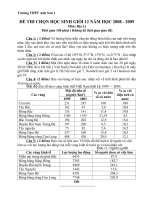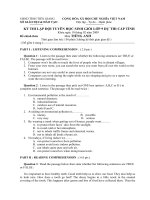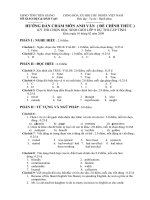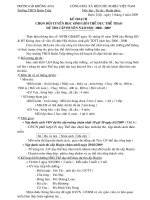thi hsg 12 08 09
Bạn đang xem bản rút gọn của tài liệu. Xem và tải ngay bản đầy đủ của tài liệu tại đây (113.75 KB, 9 trang )
LĐT.HSG 12.CT
UBND TỈNH TIỀN GIANG CỘNG HÒA XÃ HỘI CHỦ NGHĨA VIỆT NAM
SỞ GIÁO DỤC& ĐÀO TẠO Độc lập - Tự do - Hạnh phúc
KỲ THI LẬP ĐỘI TUYỂN HOC SINH GIỎI LỚP 12 THPT DỰ THI QUỐC GIA
Khóa ngày 22 tháng 12 năm 2008
Môn: ANH VĂN
Thời gian làm bài: 180 phút ( không kể thời gian giao đề )
( Đề gồm 07 trang )--------------------------------------------------------------------------------------
PART I : LISTENING COMPREHENSION: ( 2.0 pts )
Question 1: Listen to the passage then pick out ONE best option ( A,B,C or D ) in each
question. The passage will be read twice:
1. In Porto, walking around is great because _______________.
A. the shops are very modern and the centre is very crowded.
B. the streets are narrow and full of churches, museums, and markets.
C. the streets are wide and full of people and vehicles.
D. the weather is warm and there are lots of shops and restaurants.
2. The writer thinks the atmosphere in Porto is_____________.
A. very exciting B. unsafe and violent
C. busy and unfriendly D. safe and friendly
3. People spend the evening hitting each other with plastic hammers___________.
A. at weekends B. every Sunday in summer
C. at São Joao in June D. when the weather is sunny
4. Which of the following is NOT true?
A. The writer really enjoys drinking wine produced in Porto.
B. People usually go to Foz at the weekends.
C. Porto is not a big town.
D. Porto is situated in the north of Portugal.
Question 2 : Listen to the passage then pick out the information to complete these
sentences. The passage will be read twice:
1. If the coffee plant is left alone in the wild, it can grow up to_______________.
2. When the berries are ripe, the_____________are used to produce coffee.
3. After the coffee beans are roasted and ground, people pack the coffee powder
in_______________ to keep it fresh.
4. In some places of the world, coffee is made very_______________, and it is served in
small cups.
.
PART II :VOCABULARY AND GRAMMAR ( 8 pts )
Question 3: Pick out ONE best option ( A,B,C or D ) to complete each sentence :
1. We are………busy to think about that problem at the moment.
A. much more B. far too
C. really D. simply
2. Please help me! I couldn’t open the jar……….hard I tried.
A. in spite of B. no matter
C. whatever D. however
3. He tells his daughter to eat all her food or……….she would not get any toys.
1
Đ
ề
Đề chính thức
LĐT.HSG 12.CT
A. instead B. in fact
C. else D. in case
4. Mrs. Laurence has to send her dirty clothes to the laundress’s because her washing
machine was out of…………..
A. order B. fashion
C. work D. position
5. Janet should have stayed out of the sun because her skin is so…………..
A. senseless B. sensible
C. sensitive D. insensible
6. A good friend will…………you when you’re having problems.
A. stand by B. stand in
C. stand off D. stand over
7. Total colour blindness,……………, is the result of a defect in the retina.
A. is a rare condition B. a rare condition
C. that a rare condition D. a rare condition that
8. Earthquakes can damage a tree………violently, and it can take several years for the
tree to heal.
A. to cause to shake it B. when shaking it causes
C. to cause shaking D. by causing it to shake
Question 4 : Complete these sentences, using the suitable forms of the words in
brackets:
1. Coffee plants were first………in Ethiopia over 700 years ago. ( discovery )
2. He got retired 5 years ago and was then invited to be a member of the…………..
committee of the town. (advice )
3. WWF has ……….. panda as a kind of endangered animals in the world. ( classes )
4. It seems to be……….for human beings to live on Mars. It’s extremely hot there. (
possibility )
5. ………….is now applying in education and public health care in our country.
( society )
6. Weather is sometimes………….It’s hard to predict the weather exactly. ( rely )
7. Everyone likes him a lot because of his………….( generous )
8. Nowadays, mobiles are used………….in all regions of Viet Nam. ( popularity )
Question 5 : There are 8 errors in the passage below. Read the passage, find out these
errors then correct them.The number (0) is an example:
There are so ( 0.much -> many ) museums and gallleries in London which even people
who have lived there for a long time do not know them all. Some are traditional museums, but
many are now making its exhibitions interactive, or hands-on, to encourage people to touch and
understand what is on display. At the Science Museum, visitors can carry away experiments. At
the National History Museum, managers can find out how to look for fossils on the beach. At the
National Gallery, the country’s main art gallery, visitors can call up paintings on radio screens,
find out about them and then print out a plan with their location indicated. The Clink Prison
Museum is a reconstruction of a seventeenth-century prison. Visitors can look at a typical cell
and light leg irons and chains.
At MOMI, the Museum of the Moving Image, almost all the things on display move. You can
see why the first film was made, listen to the latest stereo systems and watch the news from the
1960s. You can compose your own cartoons, read the news on TV and fly like Superman over
London.
2
LĐT.HSG 12.CT
Question 6 : Choose ONE option ( A,B,C or D ) corresponding to the best sentence
which is made up from the given cue words.
1. / important / it / stop / patient / smoke / drink / at once /
A. It’s important that the patient stops smoking and drinking at once.
B. It’s important that the patient should stop smoking and drinking at once.
C. It’s important that the patient stops to smoke and drink at once.
D. It’s important that the patient should stop to smoke and drink at once.
2. / balcony / high building / good / view / football match /
A. The balcony of the high building can make the football match better to view.
B. From the balcony of the high building, we can have a better view of the
football match.
C. From the balcony of the high building, the football match can have a good
view.
D. The football match can view the balcony of the high building quite well.
3. / police’s warnings / people / refuse / helmets /
A. Despite the police’s warnings, many people still refuse to wear helmets.
B. Because of the police’s warnings, many people refuse wearing helmets.
C. Thanks to the police’s warnings, many people still refuse of wearing helmets.
D. Even though the police’s warnings, many people refuse not to wear helmets.
4. / ages / be / they / go / Da Lat /
A. It has been ages when they last went to Da Lat.
B. It has been ages when they have gone to Da Lat.
C. It seems to be ages since they last went to Da Lat.
D. Since they have gone to Da Lat, they have been ages.
5. / stop / we / play / tennis / because / rain / start /
A. We stopped playing tennis because it rain starts.
B. We stopped playing tennis because of it started to rain.
C. We stopped playing tennis because it started to rain.
D. We stopped to play tennis because it started to rain.
6. / computer / run / ten time / fast / this / old one /
A. This ten times computer runs faster than the old one.
B. This computer runs ten times faster than the old one.
C. This computer runs fast ten times than the old one.
D. This computer runs faster ten times than the old one
7. / this coat / you / prefer / coat / wear / yesterday /
A. I prefer this coat to the coat you wearing yesterday.
B. I prefer this coat than the coat you were wearing yesterday.
C. I prefer this coat to the coat you wear yesterday.
D. I prefer this coat to the coat you wore yesterday.
8. / Einstein / can / not / speak / until / he / eight /
A. Not until Einstein was eight can he speak.
B. Einstein could not speak until he was eight.
C. Einstein cannot speak until he was eight.
D. Not until Einstein was eight he can speak.
PART III : READING ( 6.0 pts )
Question 7 : Read the passage below then pick out ONE best option ( A,B,C or D ) in
each question :
3
LĐT.HSG 12.CT
Disasters are usually unexpected. For once, this was one which everyone had expected. Even
so, when Mount St Helens actually exploded in Washington State on Sunday, 18
th
May 1980, it
did so suddenly and dramatically __ and left some 100 people dead.
Geologist David Johnston was keeping watch at the Coldwater Two observation post five
miles north of the summit of Mount St Helens. For seven weeks the 2,949-metre snow-covered
mountain had been giving out signs of imminent eruption. Johnston was at one of a number of
observation points from which geologists were keeping up with the state of the mountain and
reporting back to the US Geological Survey base 40 miles south of the summit at Vancouver,
Washington State.
At 8.32 a.m. that Sunday, Johnston got on to the base and shouted over the radio:
‘Vancouver, Vancouver. This is it. The mountain’s going!’ They were the 30-year-old
geologist’s last words. He died instantly as the volcano exploded with a force 500 times greater
than the atomic bomb dropped on Hiroshima, taking 400 metres off the top. Any attempts to get
through to Johnston again were useless.
People heard the noise 200 miles aways. But the mud and ash quickly caught up with Bert
Delfonso, a logger, only 25 miles away. He said it was ‘like the end of the world. Heavy, thick
cloud boiled up, while and blue, lightning flashes crackled through the mountains. It rained mud
balls. And after that the ash came down. It just got black, and I mean pitch black’.
Another witness said: ‘I broke out in a cold sweat, and ran.’
Within seconds the volcano had put on a terrible display. The north wall collapsed and gas, ash
and rock blasted up into the air, some up to 16 miles into the stratosphere. Snow melted instantly
and avalanches of mud and rock hurtled down the sides of the volcano at 100 mph, sweeping
away homes, cabins, bridges and millions of fir trees. One flow of debris blocked the outlet of
Spirit Lake. When the ash fell, it fell on the state fish farm at Green River killing 10,000,000
salmon, and on the wheat fields and orchards to the east.
Until 1980 the volcano had been inactive since 1857. In 1975 geologists had predicted that it
might erupt ‘perhaps before the end of the century’. And then seven weeks before the disaster,
the experts came up with a more exact prediction. They said an eruption was imminent and that
an evacuation programme should begin. They declared two zones around the mountain ( a red
zone and a blue zone) and set up blockades to stop people going in. But in the weeks that led up
to that Sunday, tourists, loggers, property-owners, newsmen and mountain climbers had entered
the ‘forbidden’ zones. Some of these people paid with their lives. Later, it was found that ash and
molten mud had caught up with many: falling trees had killed others.
David Johnston had always known that the mountain would blow fast when the time came. He
thought they would have about two hours’warning. In the event, he had hardly any warning at
all. Searchers found only a four-foot-high pile of black ash where Johnston’s trailer had stood.
When the dust and ash had finally settled, what kinds of problems do you think people in
nearby towns and cities had to face up ?
1. The disaster happened when__________
A. an atomic bomb was dropped on Hiroshima .
B. a bomb exploded at the US Geological Survey base.
C. Mount St Helens erupted in the United States in 1980.
D. there was an explosion in the US capital in 1980.
2. The eruption at Mount St Helens happened _________
A. suddenly without any signs of warnings in advance.
B. seven weeks after it had given out signs of imminent eruption.
C. repeatedly one by one in some days during seven weeks.
D. seven weeks earlier than the geologists’ prediction.
3. Right after Johnston saw the eruption, he___________
A. drove quickly to the US Geological Survey base.
B. reported quickly to the US Geological Survey base by radio.
4
LĐT.HSG 12.CT
C. quickly escaped from the site by helicoter.
D. couldn’t report any words to the base in Vancouver.
4. After the explosion at the summit of Mount St Helens, the mud and ash caught up
anybody and anything ___________ away .
A. 25 miles B. 200 miles
C. 16 miles D. 400 metres
5. Some of the gas, ash and rock blasted up into the air up to the __________.
A. snow-covered summit B. outer space.
C. Geological Survey base D. stratosphere
6. Before this eruption, Mount St Helens had been living in peace since _________
A. the end of the previous century B. 1980
C. 1857 D. 1975
7. Seven weeks before the disaster, geologists suggested_________
A. carrying out an evacuation programme.
B. building a series of observation points.
C. building a long wall to prevent the hot lava.
D. sweeping away homes, cabins, bridges and trees.
8. A lot of people paid their lives in this disaster ___________
A. while running away from the blue zone.
B. for entering the ‘ forbidden’ zones.
C. while climbing to the summit of Mount St Helens.
D. for stopping people evacuating from the red zones.
Question 8 : Fill in each numbered blank with ONE suitable word to complete the
passage below:
Sanjit Ray works for a computer company in Los Angeles, California. He writes computer …
( 1 )…. But he doesn’t go to Los Angeles every day. In fact, he doesn’t live in the USA. He lives
in India. Every day, he…( 2 )…the bus into Bombay and he goes to an office there. The
computer company sends information to him…( 3 )…e-mail. He works on the information on a
computer and then he sends the program back to California. The computer company doesn’t do
the work in the USA because it costs…( 4 )…to do it in India. Salaries there are…( 5 )….Also,
India is twelve hours…( 6 )…of California. So the computer company sends information at the
end of the day and Sanjit works on it when it’s…( 7 )…time in the USA. When he sends the
programs…( 8 )…, they arrive in California before the computer company starts in the morning.
Question 9 : The article below is not complete and logical. Eight paragraphs or
sentences have been removed from it. Find out one of the suitable paragraphs / sentences
( A- I ), then insert it into the gaps ( 1- 8 ) where it should be to make the article a good one.
There is one extra paragraph which you do not need to use:
THE DAY I WILL NEVER FORGET
That day in May three years ago could have put me off flying completely, but it didn’t. I had
always wanted to take up flying, but it wasn’t until I had seen an advertisement for a cheap trial
lesson that I decided to try it.
__ or at least I thought I did! So I rang up the flying club and booked a lesson.
When I turned up at the club, I paid and then met my instructor, who turned out to be a woman.
5
1
2

